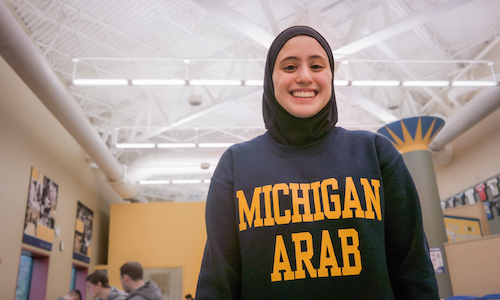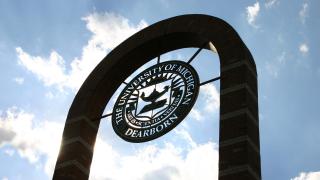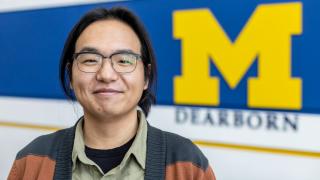All year long, we’re celebrating the university’s 60th anniversary, and there are few more personal ways to explore the breadth of that history than through the stories of alumni. But how do you go about representing six decades worth of graduates? That was one of the tasks thrown to UM-Dearborn junior Amanda Saleh this past summer as part of her Development Summer Internship Program (D-SIP) stint at the Office of Alumni Engagement. Recently, we chatted with her about the project — and what she’s taking away from the experience.
The Reporter: So 60 years — that’s a big target area for research. Where’d you even start?
Amanda Saleh: So I actually had two specific projects. The first was to put together a timeline of interesting or important events from the past 60 years. And for that, I kind of lucked out because there are these two historical books called, A Gift Renewed and The Gift Matured, that do a good job of covering the history from the start of the university until about 2009. Then, I did my own research about key events from the point where the books leave off all the way up until today.
Reporter: And did you learn anything cool as you dug through all that history?
Amanda: One thing I thought was sort of funny is that enrollment growth is always the goal. Like, I found references to plans about increasing enrollment going all the way back to the 1980s! Another thing I thought was really interesting was just how much more diversity there is now. Diversity — like, in terms of the number of students of color— was around 9.6 percent in the 1970s; now it’s like 27 percent. In fact, it’s probably a lot more, if you include ME/NA data. That’s people of Middle Eastern or North African heritage.
Reporter: And you mentioned there was a second project…
Amanda: Right, so the second project was focused on collecting stories from alumni. The sources for that research were really varied. I went through old issues of the university magazine, Legacy, to see who might be interesting to talk to. I also searched Google and LinkedIn to get more leads. Then, I compiled a list of people who sounded interesting, but I also tried to keep in mind having a diverse list — so varying backgrounds, graduation years, colleges and also races. I ended up with more than 200 alumni, which I narrowed down to 53, and then eventually down to 10, who I did interviews with.
Reporter: Wow, so sixty years, 10 people. Tell us about a few who made your cut.
Amanda: I thought Annette Berry was really interesting. She’s a judge in Wayne County, and she also teaches here. We talked a lot about the emotional intensity of her work, because throughout her career, she has dealt with many cases that involve heavy things like domestic abuse or drugs. She told me how she would intentionally take mental breaks or step away from a case and call her husband, just to get her emotions out. By doing that, she could regroup and stay focused on the work. She also had a really interesting view on the issue of victimization. She had challenges being a woman in the workplace, but she was always really proactive and didn’t take people’s B.S. I think she drew a lot of strength from her family and how she was raised. And that made me think about where that resilience comes from. Like, sometimes when you’re raised in a household that is really supportive, I think you’re more likely to be bulletproof. But if you didn’t have that, it’s going to be a lot harder to take what the world throws at you.
Reporter: That’s a really interesting way of looking at it. How about two more folks who struck you as having interesting stories?
Amanda: Leah Olajide, for sure. We talked about how she was one of the only black students in the journalism program and how she found her place on campus through the Michigan Journal. In fact, she was the first African American editor of the Journal. I think for her, passion for journalism and having that community of writers was what sustained her — despite not having a lot of people around her who looked like her. Still, I tried to put myself in her shoes, and I imagine that must have been really challenging. Like, if you grew up in a community where you got discriminated against for your race, think about how much harder it would be to reach out to people who are different than you. So I found her to be really inspiring.
I also thought Muhi Khwaja was really interesting. He graduated 10 years ago, and he talked about his philanthropic work, which is filling some gaps in the Muslim community. He started his own foundation, and families come to him and he helps connect them with donor opportunities that align with their interests. I found it to be compelling work because in the Muslim community, charity is one of our five pillars, and so we have this obligation to give money every year. And he’s bridging the worlds of philanthropy and religion is this totally new way.
Reporter: And how about you — other than these stories, what are you taking away from the experience?
Amanda: So many things. I would have to say that I've learned how to navigate ambiguity. Like, I had no idea how each interview would turn out, where each conversation would lead, and whether or not I would click with my interviewees. I kind of just did my research, reached out to alumni, and stepped into the unknown. But it was worth every bit of uncertainty. And I think the interviewing has given me a newfound interest in podcast work. For Leah’s interview, I got to produce sort of a pilot of a podcast, and seeing the level of detail that goes into the audio editing was really interesting to me. Even a breath matters, a sigh, a silence. Also, I realized people’s stories are so complex, and you can really only capture a little slice of them from a single interview. But if you are conscious about it, you can still find that little piece that holds a universal meaning. So I think I’d like to find more opportunities to do work like that. Even if it’s just as a hobby.
###
Amanda Saleh was part of the Development Summer Internship Program's (D-SIP) class of 2019. D-SIP is now accepting applications for 2020. You can find more details about the program.




